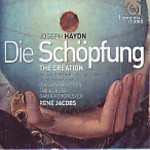René Jacobs gave us a recording of The Seasons that was absolutely stunning. This version of The Creation also has some very fine moments. First, the RIAS Kammerchor sings with amazing clarity and precision, and as usual with Jacobs’ productions for HM, the solo singers are excellent. Julia Kleiter and Johannes Weisser do a terrific job as Adam and Eve in Part 3 (their big duet doesn’t sound a moment too long, which is a big achievement), and tenor Maximilian Schmitt delivers one of the most appealing renditions of “In Native Worth” on disc. Finally, Jacobs conducts with his usual characterful verve, particularly where you might expect: in the illustrative recitatives in Part 2.
So far so good, but there are two major problems that limit this production’s appeal. First, this is a pint-sized view of the work. When he made The Seasons, Jacobs had a slightly larger ensemble, and the rustic gusto of the music requires less in the way of Handelian monumentality. Here, with strings 7,6,4,3,3, the ensemble sound is remarkably scrawny. The Representation of Chaos, with everything muted, sounds more like the Temple University Kazoo Choir, or one of those P.D.Q. Bach productions with double reeds–minus the oboes and bassoons. Haydn’s score is, of course, performable with smaller forces as a practical matter, but he wanted the largest number of people he could get, and whatever the size of the actual ensemble the performance has to sound big. Spering (Naxos) and Hengelbrock (dhm) achieve that, while Hogwood (L’Oiseau Lyre), with his authentically huge forces, proves triumphantly the validity of Haydn’s large-scale conception.
Finally, there’s the Freiburg Baroque Orchestra, a group whose string playing is so ugly, so devoid of variety and stylishness, that it becomes a real issue of competence. It’s not just the lack of vibrato (Haydn clearly wanted vibrato, notating it in various ways). All three of the performances just mentioned use period instruments and “authentic” performance practice, and none of those string sections sounds this dreadful. The orchestral introductions to the more lyrical arias utterly lack the essential vocal cantabile (try CD 1, track 19, for an especially ghastly example), while the theoretically roiling sea in “Rollend in schäumenden Wellen” gives new meaning to the term “tempest in a teapot”. It’s a shame, really, because there’s so much good here otherwise.
Perhaps the best way to sum up all that’s right and wrong with this performance is to consider the concluding number of Part 2, “Vollendet ist das grosse Werk”: chorus, excellent; soloists in the central trio, terrific; woodwinds, plaintive but charming; strings, horrible; Jacobs, lively; impact, not as big as Haydn clearly intended; sonics, extremely clear, so much so that one of the most prominent instruments is the belching contrabassoon–another byproduct of the minimalist conception. The set includes a “making of” DVD because everyone seems to be operating today under the assumption that everything the artists and producers say and do is intrinsically fascinating. You be the judge. A mixed bag, then, but one I may return to now and then for the fine soloists and vivid realization of Haydn’s pictorial writing for orchestra. For the music’s grandeur, and lyrical warmth, though, you’ll have to look elsewhere.
































